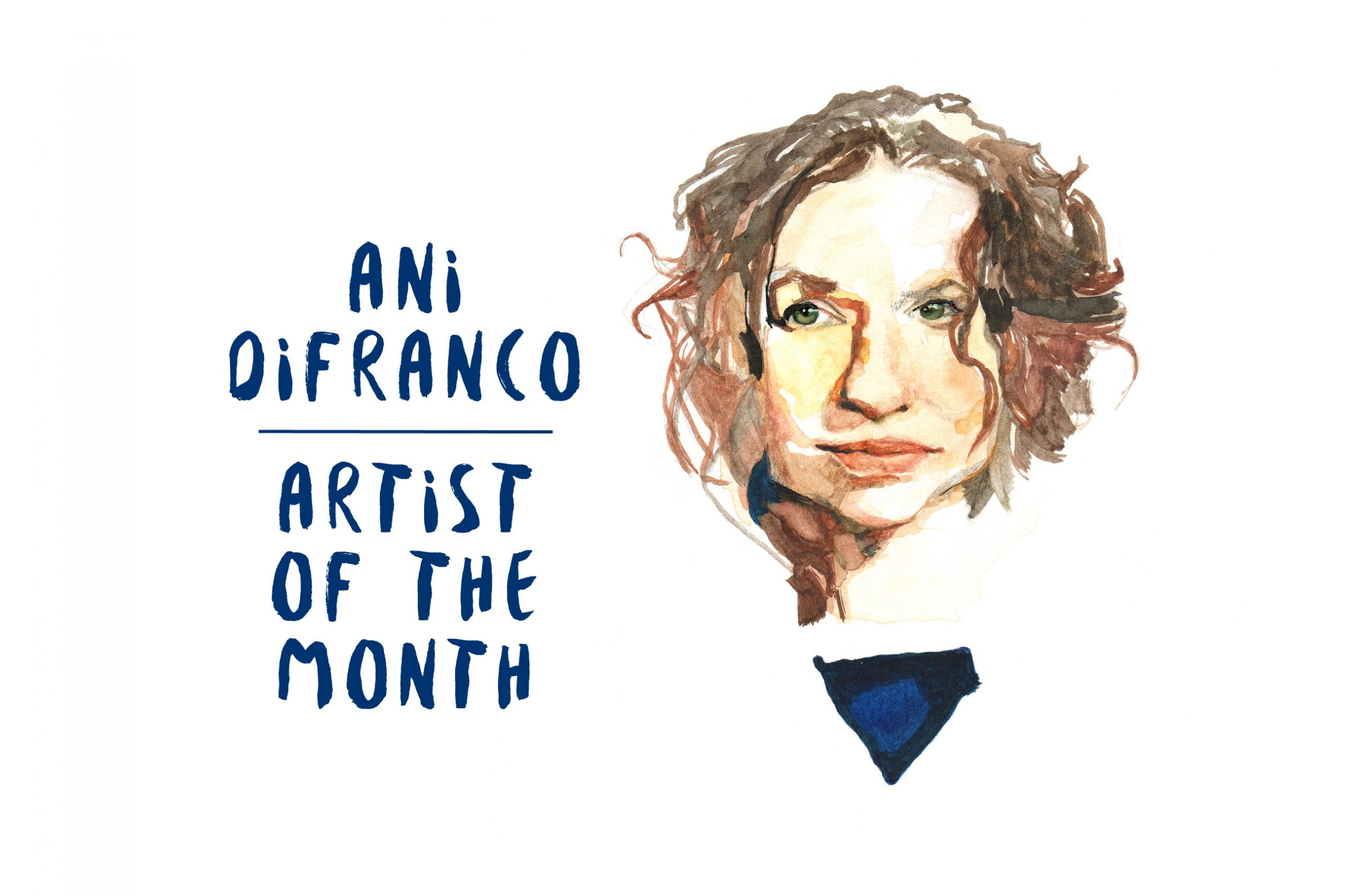Two decades ago, 1996 was a leap year, a time before America had lost itself in iPhones and Instagram, before music was as much of a soundtrack to life and love as it was a 10-second signal that your mom was calling, and why weren’t you picking up? It was also the year that Ani DiFranco released Dilate, her seventh album, which began, about one minute in, like this:
“Fuck you, and your untouchable face,” she sang. “Fuck you, for existing in the first place.”
DiFranco fired those words with both tenderness and insurmountable fury. And when she did, she spoke for a generation of people who were sick of being polite and playing by the rules — who didn’t fit in with political norms, gender norms, sexual norms, norm norms. With her hair braided and her arms toned from hours upon hours of strumming the guitar, she smiled as she sang; venom dripped from her lips, sealed with a kiss. Her words often rolled out like poetry or magnificent chains of thought, and she didn’t sensor. She was both a political voice and slinger of love songs, a truth-teller and a vehement judge. She took artificial nails and attached them with electrical tape, so she could pluck the strings hard enough to ask the harder questions. It was certainly never what Lee Press-Ons had in mind.
Dilate was just over 20 years ago. And her new LP, Binary, is her 20th studio album. But anyone who expected DiFranco to look back retrospectively on any of those occasions is searching in the wrong place, for the wrong person.
“I’m not really about heralding numbers or time,” DiFranco says. “For me, it’s really all one long song. Other people have asked or presented the idea of looking back. On the anniversary of Dilate, it was, ‘Oh, you should go back on tour and play Dilate!’ I’m like, ‘No, no. That is never going to happen! Next idea?’ I’m into looking forward. What’s the next idea? What’s the uncharted territory?”

Binary is DiFranco taking stock of her present, our present, and, in her own sort of premonition-inclined mind, the future. Though the songs were written before Donald Trump was elected president, they feel as though they could be a reflection on the 2016 election cycle and the world at large, and that sort of preternatural sense is something that DiFranco has always possessed. “See how quickly shit gets absurd,” she sings on “Alrighty.” “You invented angels and then you ignore the birds.” Or, on “Play God”: “You don’t get to play God, man. I do.”
“That has happened to me my whole songwriting life. I’m like a Sunday scientist,” she says in the DiFranco chuckle, mischievous as it is. “I love quantum physics. I love the vanguard of scientific understanding, which has brought us full circle back to a very ancient understanding. I go into this subconscious place when I am writing. That shit, my consciousness sees it coming, even though I don’t know what I am writing about until it happens.”
Many have long-turned to DiFranco as a fearless feminist leader: An activist and outspoken voice against the patriarchy of politics, corporate America, and everything in between, she launched Righteous Babe Records in 1990 as a way of taking control over her own artistic property. She was always going to grow and change, but the morphing DiFranco was sometimes a difficult thing for her long-time fans to stomach. Getting married, having children … these choices occasionally were hard for those who saw DiFranco as belonging to only herself — up there on the stage, tank top tight with sweat and chinos that could have been worn by both a woman or a man — and to them. And though she has released albums since giving birth to her two babies, now 4 and 10, Binary is an album that explores how exercising our rights to belong to one another — be that a lover, a son, a daughter, a friend, or even our green earth — is one of the most feminist proclamations of all.
“I was trying to approach this concept of feminism without saying the word ‘feminism,’ and really get at it in an elemental way,” she says. “That the universe is born of relationships. And until we start holding that understanding as high as we do the individual and the hierarchy of individuals in competition, then I think we’re never gonna get to the right answer.”
The process of becoming a mother was a complex one for DiFranco. Though the act of raising a child “totally reinforces my feminism,” she says, some of the constructs of parenthood were more difficult to see through her enlightened lens.
“I remember the first time I had to push a stroller down the street,” she says. “I felt like such a fucking asshole. There was something about pushing a stroller down the street that didn’t fit with my sense of my own identity. I sort of remember in a humorous way trying to reconcile my identity as a mom with my life until then. But that’s surface, superfluous. Underneath it, the real situation for me was that becoming a mom really reinforced everything I thought I knew. Once I had actually lived the literal experience of ‘Your body is my body,’ I could stand there as tall as I ever did and say, ‘This idea of autonomy is a fallacy.’ The feminist idea is holding relationship higher than anything else. There is no separation between you and me.”
Indeed, Binary is about how our existence, our thoughts, our love, our presence, our fights are only in relationship to something else or someone else. So to celebrate that spirit, she decided to extend outward and invite some participation from special guests: violinist Jenny Scheinman, keyboard player Ivan Neville, Maceo Parker, David Bowie bassist Gail Ann Dorsey, and Justin Vernon of Bon Iver.

“My manager said, ‘You have a lot of amazing friends. You should call them. You should connect with people,'” she recalls. “A lot of my artistic life has been in isolation. I write songs alone. I play them alone. I develop a relationship with an audience alone. But I’ve always been jealous of people whose bands are beautiful communities, and I have been more solitary than I want to be in my art. Calling people up and connecting with them, that was just one of the oblique strategies in his record. How do you make album 20 new and fucking fun again?”
Binary is, well, fucking fun. It’s full of fire, horns, and funky riffs, and stacks of DiFranco couplets that feel as urgent as ever: “They got networks like insects with webs of deception,” she sings on the title track, both a manifesto for the album’s central themes and a call to put down our screens and look not into that white glare, but the white’s of each other’s eyes. And not just look, but listen. “Right from the beginning, I was like, ‘Fuck all that,'” she says. “‘Talk to me.'”
In 2016, DiFranco used her tour to encourage voter turnout: Called “Vote Dammit,” she registered fans in each city she passed through. And she will, of course, still stay political in a Trump era, letting the words of Binary lead the way. But she’s also paying attention to what lies beneath the dark side; and she has been following the shifts in the energy of the earth charted as the “Schumann Resonances.” Remember, she’s a Sunday scientist. Things had been pretty steady here on the planet, but then, just as Trump took office, that measure of energy plummeted.
“If you’re me, you could take this really far,” she says laughing. “What we see up there at the podium is the shadow side of an awakening. And this is the trigger. This is what it takes for us to wake the fuck up. And I feel so excited that there are people who want to talk about the things I want to talk about. And I feel less alone and more hopeful in many ways than I have in my whole life.”
Because consciousness, as she sings, is binary.
Lede illustration by Cat Ferraz.






